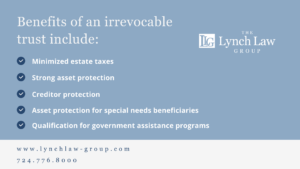What is an irrevocable trust?
An irrevocable trust, created by a grantor, is a type of trust that cannot be revoked or amended by the grantor during their lifetime or at the time of the grantor’s death. Once the irrevocable trust is created, it can only be amended or modified in accordance with the Pennsylvania Uniform Trust Act.
What are the benefits of an irrevocable trust?
An irrevocable trust can minimize federal estate tax and state inheritance tax, protect the grantor’s assets from creditors, and allow for the grantor to provide structure for the benefit of individuals (i.e. spendthrift, minors, or special needs beneficiaries) who may be unable to care for themselves.

Minimized estate taxes
Property that is transferred into an irrevocable trust is no longer part of the grantor’s estate, and therefore does not contribute to the value of the grantor’s taxable estate under the Internal Revenue Code.
Asset/Creditor protection
An irrevocable trust is protected from creditors because once the property becomes part of the trust, that property no longer belongs to the grantor. Instead, the property belongs to the trust and a trustee administers the trust for the benefit of the beneficiaries, which can include the grantor and/or other beneficiaries.
Asset protection for minors/special needs beneficiaries
An irrevocable trust can protect assets for beneficiaries with special needs (individuals who are legally disabled and receiving medical assistance or Supplemental Security Income benefits). The grantor may design their irrevocable trust in a way to avoid disqualifying their beneficiaries from government assistance, including Medicare, Medicaid and Social Security.
What are the disadvantages of an irrevocable trust?
Lack of flexibility
Once created, an irrevocable trust cannot be modified, revoked, terminated, or annulled. Should the grantor’s priorities, goals, financial situation, or family relationships change, the original terms of the irrevocable trust remain.
Control of assets
Once a grantor moves their assets into an irrevocable trust, the grantor loses control over the assets and the trust — administered by a disinterested trustee, who is not the grantor — now owns the assets. If the grantor’s financial situation changes, both grantor and beneficiary are subject to the discretion of the trustee, in most respects.
What are the key differences between a revocable trust and an irrevocable trust?
Creditor protection
A revocable trust can be changed, amended, or revoked during the grantor’s lifetime.
A revocable trust enables the grantor to manage assets during their lifetime; however, this ability to control assets precludes creditor protection, unlike an irrevocable trust.
Taxes
An irrevocable trust must file its own income tax return. However, an irrevocable trust may qualify as a “pass-through” entity for tax purposes, and may be drafted with terms to permit the distribution of income to its beneficiaries. In doing so, a pass-through irrevocable trust can minimize the income tax by passing the income through to the beneficiary, who will then be required to report that income on their personal income tax return.
If an irrevocable trust does not pass through the income to its beneficiaries, that income is subject to tax at the fiduciary income tax rates, as identified on the tax rate schedule listed below for 2020.
Unlike an irrevocable trust, funds within revocable trusts are still considered the property of the grantor and the income is reported on the grantor’s personal income tax return.
Pittsburgh Estates & Trusts Attorneys
The Estates & Trusts team at The Lynch Law Group assists clients in evaluating and implementing estate planning strategies that align with their wishes for the passing of their assets. Contact us at (724) 776-8000 for information about irrevocable trusts and other estate planning instruments.





